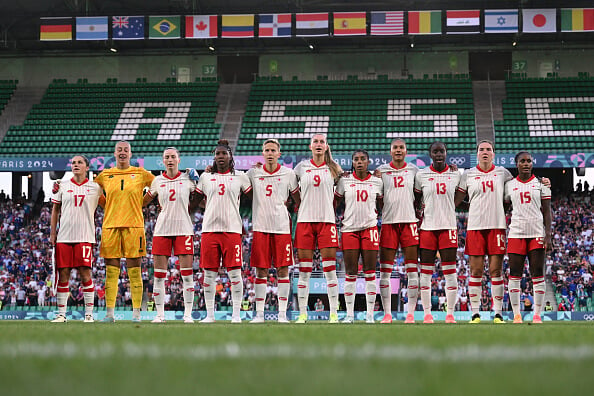The Court of Arbitration for Sport on Wednesday upheld a six-point Olympic tournament deduction for the Canadian women’s soccer team in a drone spying scandal, affirming FIFA’s choice to heavily limit the reigning gold medalist as questions arose about its tactics to prepare for a repeat.
The dismissal of Canada’s appeal came hours before the entire field of 12 teams and three divisions was set to play the final games of group play, a decisive moment with four teams to be eliminated by the end of Wednesday night.
The implications were most clear for Canada and the rest of the teams in Group A, but were heavily resonant for the third place teams in Group B and Group C – as of Wednesday afternoon, Australia and Brazil, respectively – as only two of the three third-place finishers advance to the quarterfinals.
Following CAS’s decision to uphold FIFA’s docking of points, Canada remains in third place in Group A on zero points, with a plus-2 goal differential, despite two wins here in France so far this tournament. There is still a path for the Canadians to advance to the quarterfinals, depending on Wednesday’s results across all three groups.
Canada is scheduled to face Colombia in Nice at 9 p.m. local time, 3 p.m. ET.
CAS did not give a reasoning for its dismissal, but said it would share fuller details about its decision later, without the urgency of games on the same day.
The Canadian Olympic Committee and Canada Soccer disputed FIFA’s ruling on Monday, arguing that the punishment equivalent to erasing two wins “unfairly punishes the athletes for actions they had no part in and goes far beyond restoring fairness to the match against New Zealand.”
In addition to the points deduction, FIFA suspended Canada’s coach, Bev Priestman, and two other team staffers for one year and issued a fine. Canada did not dispute the suspensions.
The spying first came to light July 22, when New Zealand team staff members noticed a drone flying above their practice in Saint-Étienne, France, and notified police. Law enforcement tracked the drone back to its operator, Joseph Lombardi, an analyst with the Canadian women’s team, the Canadian Olympic Committee said.
FIFA’s decision concerned Canada Soccer’s actions at the Olympics only. The international governing body found that Canada Soccer was “responsible for failing to respect the applicable FIFA regulations in connection with its failure to ensure the compliance of its participating officials of the OFT with the prohibition on flying drones over any training sites.” Priestman, Lombardi and assistant coach Jasmine Mander were all found “responsible for offensive behavior and violation of the principles of fair play.”
Before Priestman’s suspension from FIFA, she was suspended through the Olympics and until the conclusion of a wide-ranging investigation from Canada Soccer that will extend across both the men’s and women’s programs. She pledged to fully cooperate with that investigation in a statement Sunday, when she apologized to Canada’s players.
Lukas Weese contributed reporting.
Required reading
(Photo: Tullio M. Puglia / Getty Images)

